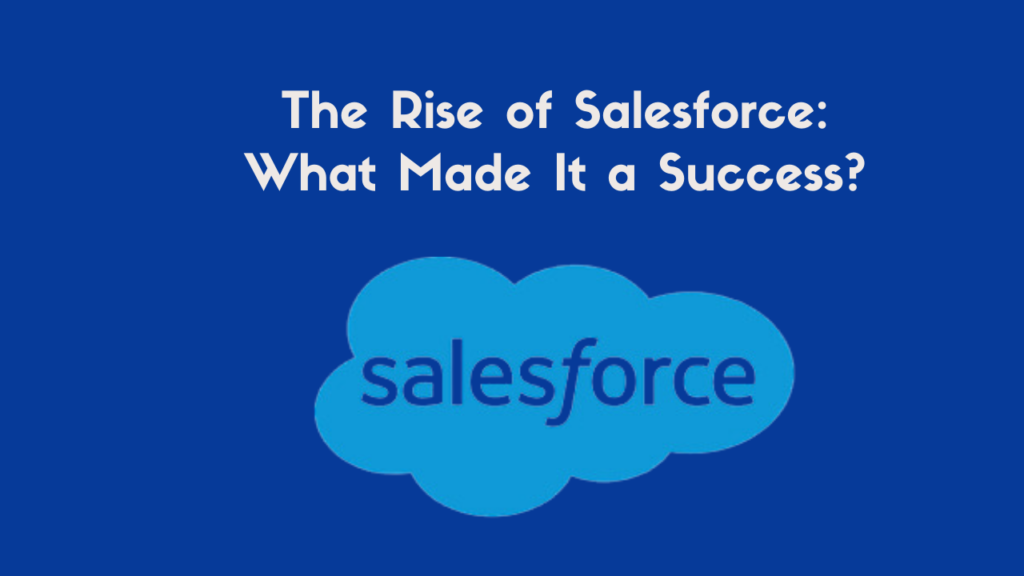The Rise of Salesforce: What Made It a Success?

In today’s era of abundant data generation, businesses require platforms like Salesforce to effectively utilize their customer data. Salesforce serves as a vital CRM platform embraced by startups to Fortune 500 companies. This Salesforce tutorial aims to elucidate what Salesforce is and its immense benefits.
Why Use Salesforce?
Before delving into understanding Salesforce, it’s crucial to grasp the concept of CRM. In the past, manual data management was the norm, with information jotted down and stored in files, limiting the full utilization of available data.
As technology evolved, companies transitioned to using Excel sheets and documents, but this approach became time-consuming and inefficient when handling substantial data volumes. The need arose to effectively manage and analyze vast user data, leading to the introduction of CRM (customer relationship management) to enhance customer satisfaction.
Initially hosted on company servers, traditional CRM solutions were expensive and challenging to use. The breakthrough came with the development of Salesforce, aiming to offer an affordable, online CRM service.
What Is Salesforce?
Salesforce is a renowned American cloud-based software company providing CRM services. It offers a popular CRM tool utilized by sales, support, and marketing teams globally. Through cloud technology, Salesforce enables businesses to connect better with partners, customers, and potential clients. It empowers companies to track customer activity, conduct marketing campaigns, and more.
What Does Salesforce Do?
Salesforce is a cloud-based CRM platform enabling businesses to manage customer data, sales operations, and marketing campaigns. It offers various tools for customer segmentation, data management, and support, along with integrations with third-party applications.
How Does Salesforce Work?
Serving as a centralized platform for managing customer accounts, sales leads, and support cases, Salesforce is accessible via web browsers, mobile apps, or desktop applications. Users can customize and create objects, fields, and reports, and leverage marketing automation and AI capabilities.
Salesforce and CRM Background
Salesforce assists in tracking customer interactions and sales data, managing leads, contacts, and opportunities, and automating sales and marketing processes.
Salesforce Architecture
The Salesforce architecture includes multi-tenancy, metadata-driven development, and robust APIs, offering cost-effectiveness, easy customization, and powerful development capabilities.
What Is Salesforce Infrastructure?
Salesforce Infrastructure powers the cloud computing platform, providing scalability and fault tolerance. Consisting of various components like servers and development environments, it’s continuously updated to meet evolving needs.
Salesforce Services
Salesforce provides Software as a Service (SAAS), Platform as a Service (PAAS), and Infrastructure as a Service (IAAS), offering comprehensive development frameworks and services.
Salesforce Cloud Services
Salesforce offers various cloud services like Sales Cloud, Marketing Cloud, Analytics Cloud, IoT Cloud, App Cloud, and Service Cloud, aiding sales, marketing, and analysis needs.
Salesforce Applications
Salesforce applications enhance customer service, customize data, facilitate data reporting, and help understand customer behavior for better interactions.
The Top 7 Benefits of Salesforce
- Enhanced Time Management
- Unmatched Accessibility
- Increased Revenue Potential
- Greater Customer Satisfaction
- Simplified Account Planning
- Trusted Reporting
- Improved Team Collaboration
Salesforce Cloud Services
- Sales Cloud: A cornerstone of Salesforce’s offerings, Sales Cloud functions as a CRM platform managing sales, marketing, and customer support for businesses. It provides insights into lead statuses crucial for sales executives.
- Marketing Cloud: Essential for business operations, Marketing Cloud orchestrates campaigns, email management, social media, content, and data analytics using a robust tracking system.
- Analytics Cloud: Empowering users to craft visually rich dashboards from available data, Analytics Cloud offers comprehensive insights and trend analysis for businesses.
- IoT Cloud: Salesforce’s IoT Cloud handles Internet of Things (IoT) data, processing extensive data volumes generated by diverse IoT devices and delivering real-time responses.
- Salesforce App Cloud: An avenue for developing customized apps on the Salesforce platform, allowing tailored functionalities.
- Salesforce Service Cloud: Designed to elevate customer service, Service Cloud equips support teams with features like case tracking and social networking integration.
These are some prominent cloud services by Salesforce, extensively utilized by companies for sales, marketing, and analytics purposes.
In conclusion, Salesforce stands as a robust cloud-based CRM platform that revolutionizes how businesses interact with customers, manage data, and drive growth. Its adaptability, extensive range of services, and user-friendly interface make it an indispensable tool for companies of all sizes.
Through this comprehensive guide, we’ve navigated the vast landscape of Salesforce, exploring its architecture, services, benefits, and real-world applications. From Sales Cloud to Marketing Cloud, from its multi-tenant architecture to the Salesforce App Exchange Program, we’ve delved into the intricate details that make Salesforce an industry leader.
The advantages of Salesforce are abundant, offering streamlined processes, enhanced customer relationships, improved team collaboration, and, most importantly, increased revenue. Its ability to transform data into actionable insights and its role in simplifying complex tasks underscore its significance in today’s dynamic business environment.
As businesses evolve, Salesforce continues to evolve with them, providing innovative solutions and staying ahead in the realm of CRM technology. Whether you’re a startup seeking growth or an established enterprise aiming for efficiency, Salesforce proves to be an invaluable asset.
We hope this guide has shed light on the potential and prowess of Salesforce, empowering you to leverage its capabilities to drive success in your organization.

Leave a Reply